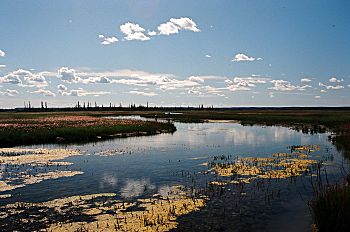Salt River (Canada) facts for kids
Quick facts for kids Salt River |
|
|---|---|
 |
|
| Country | Canada |
| Provinces | Alberta and Northwest Territories |
| Physical characteristics | |
| Main source | McNeil Lake Alberta 59°32′33.9″N 112°27′38.7″W / 59.542750°N 112.460750°W |
| River mouth | Slave River Salt River settlement, Northwest Territories 60°06′39.2″N 112°13′54″W / 60.110889°N 112.23167°W |
The Salt River is a river in Canada. It starts in Alberta and flows into the Northwest Territories. This river is special because it flows through Wood Buffalo National Park.
Contents
Where the River Flows
The Salt River begins at a place called McNeil Lake. This lake is located inside Wood Buffalo National Park in northern Alberta. From there, the river flows north. It eventually joins a bigger river called the Slave River. This meeting point is near a small village known as Salt River.
River Branches
The Salt River has smaller streams that flow into it. These are called tributaries. The two main tributaries are:
- Brine Creek
- Loop Creek
Salt River Village
At the end of the Salt River, where it meets the Slave River, there is a small village. This village is also called Salt River. People started living here a long time ago, in the late 1700s.
Important People and History
One of the most famous people who lived in Salt River village was Francois Beaulieu. He lived a very long life, from 1771 to 1872.
A Roman Catholic mission was also in the village for many years. It was there from 1850 until 1876. After that, the mission moved to a nearby town called Fort Smith.
Why "Salt River"?
The river and the village get their name from salt. Long ago, during the time of the North American fur trade, people collected salt from the riverbanks. This salt was an important resource.
 | Madam C. J. Walker |
 | Janet Emerson Bashen |
 | Annie Turnbo Malone |
 | Maggie L. Walker |

